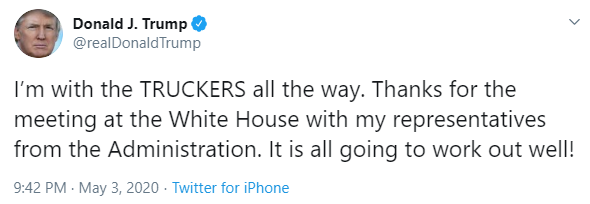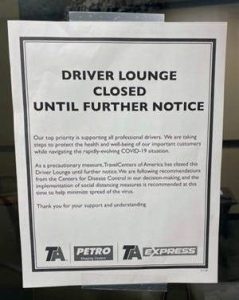The trucking industry is no stranger to adapting to new policies and procedures. The Coronavirus pandemic has presented many challenges that have required rapid change across the industry.
Just as we were settling into the relaxed HOS regulations, they change again. Just as we got comfortable with the open roads offered by fewer cars, society starts going back to work.
The economy will soon begin its recovery as people return to normal. So, what does that mean for the future of trucking?
Job Market
The Coronavirus pandemic has closed the door on new drivers entering the market. Most states have required their driver licensing agencies to severely reduce operations. As many as seventeen states have shuttered them completely.
The President and CEO of the Commercial Vehicle Training Association states that nationwide, we are seeing a 40% decrease in March For the number of new CDLs issued. The CTVA forecasted the number of new drivers entering the market will be reduced by 90% for April and 70% for May.
Tenstreet, a recruiting website for truckers, says student hiring fell 35% in almost 2 months. The hiring rate for experienced drivers is down almost 30%
When these licensing agencies begin to open again, we will likely experience a surge in the number of new student drivers and trainees. An increased supply of truck drivers means driving jobs may become harder to find.

Traffic Increases
In an April 2020 release, the American Transportation Research Institute states 87% of survey respondents have experienced shorter traffic congestion delays. The roadways have been all but cleared due to the Coronavirus pandemic’s stay-at-home measures.
Average truck speeds have increased with fewer commuter vehicles on the road. Research shows truck drivers have been clocking average speeds as high as 25mph above normal.
While truckers have been enjoying open highways with fewer commuters, this trend won’t last too much longer. State governments are slowly lifting restrictions and shelter-in-place orders, eager to get back to normal.
Traffic booms are predicted as non-essential workers begin to rejoin the workforce and remote workers return to their places of business. As always, truck drivers should remain focused and keep safety on the top of their minds.

HOS changes
During the pandemic, truck drivers experienced a regulation that most had never even dreamed of. Hours of service regulations, enacted in the 1930s, were relaxed to accommodate the emergent needs of consumers.
There were stipulations, of course. Only those drivers hauling certain products under the emergency declaration were covered, but their HOS rules were almost completely nonexistent.
However, the regulation brought about some concerns from industry leaders. While it is vital for consumers to receive their necessary items in a timely manner, truck drivers’ lives should not be put at risk. Many safety managers have discouraged their fleet from driving over 11 hours, even though it was federally granted per emergency protocol.

Online Training
Thousands of trucking companies have been integrating online safety training for years. It is a much more convenient option for truck drivers. What once took hours of planning, routing, and dispatching to the terminal for an hourlong safety meeting has been simplified.
Users can attend safety training courses on their electronic devices from their sleeper, their home, or their favorite greasy spoon. Technology allows you to concentrate over coffee and a short stack, instead of snoozing through a town hall meeting while dreaming of getting back on the road.

Remote Orientations
In brainstorming solutions to Coronavirus challenges, Infinit-I Workforce Solutions offers remote online orientation. Trucking companies have realized the benefit of online orientation not only for themselves, but for their new drivers as well.
Much the same as online training, orientation can now be conducted through an LMS platform that offers flexibility and convenience to onboarding drivers.
Truck drivers are no longer required to sit through days of orientation for most companies that have taken advantage of online orientation.
Employers can now assign courses to drivers when they are hired on. Content usually ranges from driver handbooks, safety videos, orientation, etc.
Drivers receive all the information before they even head out to the terminal for their first day. Those resources are available to the driver at a moment’s notice throughout his tenure with that company.
No more worrying about finding your tossed aside handbook or losing your fuel book. It is all saved on your phone.
So, what is your best plan of action?
Get comfy with technology.
The movement has already begun from paper to computers, just like converting from paper logs to ELDs. We are headed toward a future where all training and orientation content will be offered exclusively online.

More Interesting Articles:
FMCSA is Changing HOS… Again! 4 New HOS Rules
Uber Freight and CloudTrucks Give Truckers New Opportunities
8 Ways Truckers Relieve Stress During the Pandemic
CSA Score Reduction, How to Challenge FMCSA Crash Rulings



























